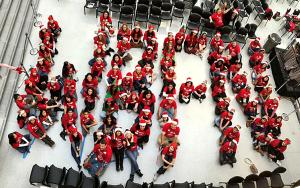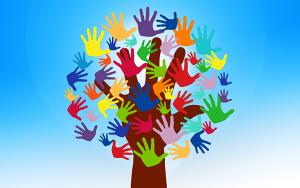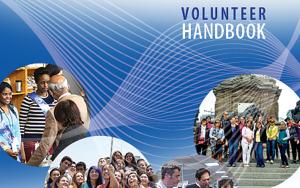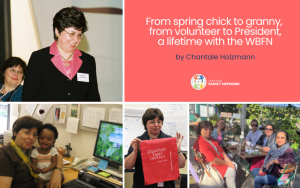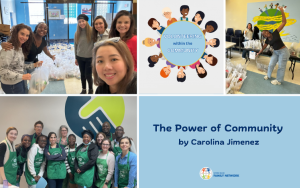
We have created Mimi, a fictional spouse from a French-speaking country in Africa, whose relocation story we will follow online as she negotiates the many challenges of any real spouse/partner. We join Mimi before she leaves for Washington DC.
Mimi’s husband has signed a two-year contract, and while going through the information he received from HR, he notices a place to fill out his wife’s contact information so that she can receive information from the World Bank Family Network. Shortly after this, the WBFN sends Mimi a welcoming email with a 45-page Welcoming Handbook on all aspects of relocation, based on the recent experiences of other spouses/partners.
It’s July 15 and Mimi, her husband and their two children have just arrived in DC. They are staying in a short-term rental close to the WBG. After applying for PID numbers from the State Department, which take up to six weeks to arrive, finding a permanent place to live is Mimi’s next priority.
Mimi decides she should attend the two-hour Welcoming Coffee at the WBFN first. She brings her children to the offices where a volunteer keeps an eye on them in a small play area. Mimi meets the Welcoming Team members and together with other newcomers receives a presentation on the most critical aspects of relocation.
At the meeting, Mimi signs up for the Welcoming Team WhatsApp, which she can use to get quick answers from the team and other spouses in the community. The Welcoming Team also takes the newcomers to the security office where they get their spouse ID’s. Talking with the team members and other spouses, Mimi gets a better idea of where to look for a house.
Mimi contacts a realtor from a list given to her by Global Mobility. The realtor drives her and the children around several times before she finds a rental house she likes, near a preschool, school, and public transportation. Later, at the rental office, she and her husband remember that she must have her name jointly on the contract (and also when signing up for utilities) because she will need this to get her driver’s license.
At the coffee, Mimi had learned about the WBG’s electronic Bulletin Board. Later, when her spouse initiates the process to get her a permanent log-on, she finds services and many second-hand items for sale by staff. She buys furniture, finds a guitar teacher for her elder child and the names of some evening babysitters.
Not everything goes smoothly for Mimi. When she calls the preschool near her new house, she finds it is full. The Welcoming Team had put her in touch with a French speaker from her neighborhood, who is able to help her locate more preschools. At the elementary school, she discovers that she needs a doctor’s certificate for her son to register, and she has to call several pediatricians before she finds one who is taking new patients.
Another challenge is getting a driver’s license. She has been driving on her foreign license, which is only allowed for a short period. When she studies her Welcoming Guide, she finds she will need to compile many documents first, including her PID number which hasn’t arrived, a letter from the WBG confirming her husband’s employment, a copy of her rental lease and a utility bill, a letter from the State Department and a letter from the Social Security Office.
After many weeks, with all of these finally in hand, Mimi goes to the Motor Vehicle Office, but though she is there for a long time, she learns she will have to return because she didn’t know that her foreign driver’s license has to be officially translated and notarized. On her second visit, she is successful, which is fortunate because the letter from the State Department (specifically for applying for a driver’s license) is going to expire soon and she would have to wait for a new one. Getting a driver’s license is the single trickiest challenge for newcomers, and she is fortunate that it only took two trips.
One thing that Mimi and her husband have to study carefully are the health insurance options. Aetna has three price levels to choose from, and then there are separate insurances for dental, prescription drugs and eye care. When she calls the physicians who are in-network (a vital cost difference), she finds again that many aren’t taking new patients. She ends up seeing one who is out of network, but she has to pay for the visit and submit the claim to the insurance company herself. It is rejected, and it takes several attempts before she understands their requirements.
Mimi has been visiting the WBFN offices whenever she has a moment. She is getting to know people there, and finally feels confident enough to volunteer. The Volunteer Engagement Team interviews her to discover her preferences and experience, and finds she is a good fit for the Social Media Team. Soon she is busy working with a team of people, using her professional skills, and even learning some new ones.
One large concern is always at the back of Mimi’s mind while she is settling in—her career. She has twelve years of marketing and communication experience, but it is all in French. She wants to get back to work, and they need the money too, but how on earth will she get a job? Her English is decent, but not good enough to write up her CV or do a challenging interview.
Mimi decides to attend the Career Lab workshops at the WBFN, and the business English classes too. The workshops turn out to be far more rewarding than she imagined. She learns about the American working culture, interviewing techniques, and how to market herself. It will take Mimi about six months to position herself well for the job market, and a further six for her to find a job.
In total, it takes Mimi about 18 months to really settle in—to find a job, make friends, and feel confident in the city. Relocation was a challenge, but it was made easier because she used the resources of the WBFN with its combined knowledge of the spouses who had relocated before her.

